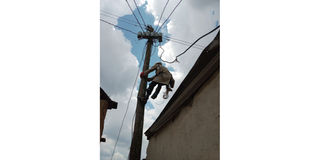Electricity tariffs will reduce gradually, says Energy minister

Electricity. An engineer disconnects illegal electricity users. The high cost of electricity is a challenge for large scale manufacturers in Uganda. PHOTO / FILE
What you need to know:
Reducing electricity tariffs cannot be done abruptly because it can cause some shortfalls in the energy sector.
Government yesterday told manufacturers that a reduction of electricity cost to US Cents 5/ KWH will be done in phases.
This was revealed by Energy Minister Ruth Nankabirwa while addressing a dialogue between Uganda Manufacturers’ Association (UMA) and Electricity Regulatory Authority with the view of increasing electricity uptake in the manufacturing sector.
Ms Nankabirwa noted that she has been planning to implement this directive from President Museveni to supply power to the Industrial Parks at US Cents 5/ KWH.
She however, said this cannot be done abruptly because it can cause some shortfall in the energy sector.
“My industry is self reliant, I sell electricity to survive. I have been talking to the President about this, that we are reducing the tariff slowly,” Ms Nankabirwa said.
While there have been considerations that power tariffs for small scale industries in value addition are reduced to five US cents, ERA agrees with Energy Minister, saying this can only be possible if it is done over a period of time.
Base tariffs
Large industrial manufacturers pay Shs386.3 in peak hours for a unit of electricity while extra-large industrial consumers incurr Shs431 as the base tariff, according to the Electricity Retail Tariff rates for this quarter between January to March 2023.
She explained that soon, the regulator who is mandated to announce the tariffs will be announcing a tariff that will not be US Cents 5/ KWH but one that will be towards achieving the President’s directive.
Electricity tariff determinants
The power tariff is a composition of power generation costs and distribution costs through which service providers recoup their investment.
The base end user tariff is adjusted on a quarterly basis during the year for changes in international prices of fuel, exchange rate, inflation and the generation mix. It also takes into consideration approved investments for power players during the year.
The movement in the exchange rate of the Uganda Shilling against the dollar directly affects the costs of power sector players because a significant portion of them (costs) are incurred in foreign currency yet the tariff is in Uganda shillings.
After the dialogue the UMA chairperson Mr Deo Kiyimba in an interview told Daily Monitor that they welcome the instructions the Minister has given the relevant MDAs and department on how they should prioritise local content.
He hinted that they are going to sign a MOU that will specify how they are going to work.
Mr Kiyimba’s assertions followed complaints by the different manufacturers that local products have not been given priority.





